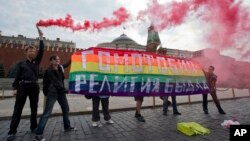MOSCOW —
A member of Russian President Vladimir Putin's ruling party tabled a draft law on Thursday to take children away from homosexual parents, adding to a raft of measures that rights activists say are undermining gay rights.
The draft law, which follows legislation banning gay “propaganda”, would add homosexuality to a list of conditions including drug and child abuse that can lead to parents being stripped of custody over their children.
The proposal highlights the more socially hardline course that Putin has charted in his third presidential term as he seeks to boost support among conservative voters.
“In the case when a parent has sexual contact with people of their own gender, the damage that can be inflicted on the psyche of a child is enormous,” Alexei Zhuravlyov, the author of the draft, wrote in submitting it to the Russian parliament's lower house, or Duma.
He said that between 5 and 7 percent of people across Russia were of “non-traditional” sexual orientation and that at least a third of those had children.
It was not clear if Zhuravlyov's proposal had a strong chance of becoming law, but it follows other legislation signed by Putin that rights activists and Western governments said are discriminatory against homosexuals.
Homosexuality was decriminalized after the 1991 collapse of the Soviet Union, but many Russians still view it as either an affliction that requires medical treatment or a crime deserving of prosecution.
Putin said this week that Russia's love for composer Pyotr Tchaikovsky, who was homosexual, was proof that the country appreciated its gay population.
But gay activists said they are being turned into scapegoats for problems including low birth rates and an HIV/AIDS epidemic that is closely tied to drug use.
One new law prevents them from adopting children. Another on so-called gay “propaganda”, which bans advocating non-traditional sexual relations around children, has caused an uproar in the West and triggered calls for a boycott of Russia's 2014 Winter Olympics in the Black Sea resort town of Sochi.
Putin has struck an increasingly conservative tone after protests against his 13-year rule, which have arisen mostly in Moscow and other larger cities in late 2011 and 2012, and rights activists accuse him of cracking down on dissent.
The draft law, which follows legislation banning gay “propaganda”, would add homosexuality to a list of conditions including drug and child abuse that can lead to parents being stripped of custody over their children.
The proposal highlights the more socially hardline course that Putin has charted in his third presidential term as he seeks to boost support among conservative voters.
“In the case when a parent has sexual contact with people of their own gender, the damage that can be inflicted on the psyche of a child is enormous,” Alexei Zhuravlyov, the author of the draft, wrote in submitting it to the Russian parliament's lower house, or Duma.
He said that between 5 and 7 percent of people across Russia were of “non-traditional” sexual orientation and that at least a third of those had children.
It was not clear if Zhuravlyov's proposal had a strong chance of becoming law, but it follows other legislation signed by Putin that rights activists and Western governments said are discriminatory against homosexuals.
Homosexuality was decriminalized after the 1991 collapse of the Soviet Union, but many Russians still view it as either an affliction that requires medical treatment or a crime deserving of prosecution.
Putin said this week that Russia's love for composer Pyotr Tchaikovsky, who was homosexual, was proof that the country appreciated its gay population.
But gay activists said they are being turned into scapegoats for problems including low birth rates and an HIV/AIDS epidemic that is closely tied to drug use.
One new law prevents them from adopting children. Another on so-called gay “propaganda”, which bans advocating non-traditional sexual relations around children, has caused an uproar in the West and triggered calls for a boycott of Russia's 2014 Winter Olympics in the Black Sea resort town of Sochi.
Putin has struck an increasingly conservative tone after protests against his 13-year rule, which have arisen mostly in Moscow and other larger cities in late 2011 and 2012, and rights activists accuse him of cracking down on dissent.





